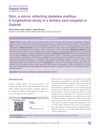 47 citations,
April 2020 in “Dermatologic Therapy”
47 citations,
April 2020 in “Dermatologic Therapy” Androgenetic alopecia linked to COVID-19 severity; drugs reducing androgen receptor activation may help.
 27 citations,
September 1992 in “The Lancet”
27 citations,
September 1992 in “The Lancet” ICL is a condition with low CD4+ T cells like AIDS but not caused by HIV, and normal CD4+ T cell counts may vary between men and women.
 20 citations,
June 2022 in “Molecules”
20 citations,
June 2022 in “Molecules” Thiazole, a sulfur and nitrogen chemical, is useful in creating potential drugs for conditions like seizures, cancer, bacterial infections, tuberculosis, inflammation, malaria, viruses, Alzheimer's, diabetes, and A1-receptor issues.
 16 citations,
July 2012 in “The New England Journal of Medicine”
16 citations,
July 2012 in “The New England Journal of Medicine” The patient was diagnosed with anorexia nervosa and severe malnutrition, requiring urgent refeeding and monitoring.
 15 citations,
January 2014 in “Dermatology”
15 citations,
January 2014 in “Dermatology” Some patients treated with peginterferon and ribavirin for chronic hepatitis C had mild to moderate skin reactions, but treatment did not need to be stopped.
 13 citations,
May 2017 in “Dermatologica Sinica”
13 citations,
May 2017 in “Dermatologica Sinica” Dengue fever can cause a temporary type of hair loss called telogen effluvium.
 12 citations,
June 2005 in “Journal of the European Academy of Dermatology and Venereology”
12 citations,
June 2005 in “Journal of the European Academy of Dermatology and Venereology” A man with HIV developed skin and hair issues after starting HIV treatment, which improved with topical treatment.
 11 citations,
March 2019 in “Journal of Medicinal Chemistry”
11 citations,
March 2019 in “Journal of Medicinal Chemistry” Some synthetic carbohydrate receptors, especially compounds 3 and 15, show strong potential for treating Zika virus.
 11 citations,
January 2013 in “Indian Journal of Endocrinology and Metabolism”
11 citations,
January 2013 in “Indian Journal of Endocrinology and Metabolism” Skin problems are common in people with diabetes and controlling blood sugar can reduce these issues.
 2 citations,
August 2022 in “Federal Practitioner”
2 citations,
August 2022 in “Federal Practitioner” A severe medication reaction required long treatment and led to hair loss and thyroid issues.










